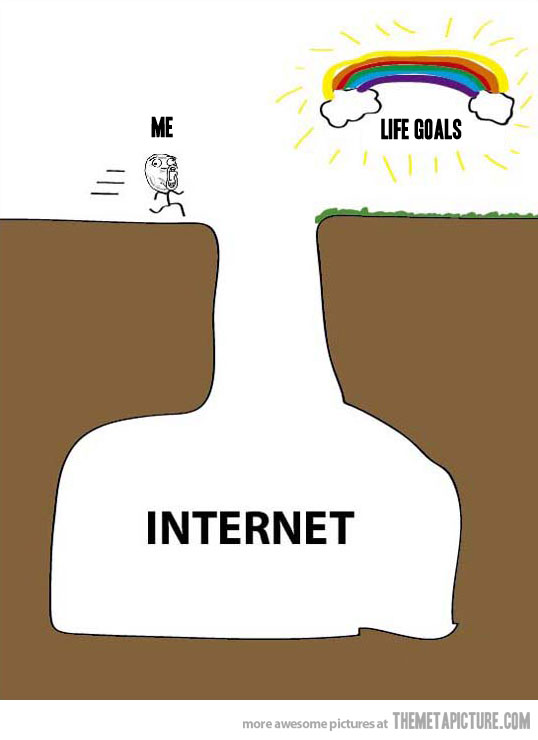5 New Secrets To Achieving Your Goals, Backed By Research
.
Goal setting is one of the four techniques the military used to increase Navy SEAL passing rates from 25% to 33%. Studies have also shown it makes you happier.
So what are five steps to achieving your goals?
1) Shut Up
Keep them secret. Talking about big goals rewards yourself ahead of time and makes you less likely to follow through.
Via Daniel Coyle’s excellent book The Little Book of Talent: 52 Tips for Improving Your Skills:
While it’s natural and oh so tempting to want to announce big goals, it’s smarter to keep them to yourself. In a 2009 experiment at New York University, 163 subjects were given a difficult work project and forty-five minutes to spend on it. Half the subjects were told to announce their goals, while half were told to keep quiet. The subjects who announced their goals quit after only an average of thirty-three minutes, and reported feeling satisfied with their work. Those who kept their mouths shut, however, worked the entire forty-five minutes, and remained strongly motivated. (In fact, when the experiment ended, they wanted to keep working.) Telling others about your big goals makes them less likely to happen, because it creates an unconscious payoff— tricking our brains into thinking we’ve already accomplished the goal. Keeping our big goals to ourselves is one of the smartest goals we can set.
Do NOT fantasize about achieving your goal. That’s eating dessert first and saps motivation. Thinking about what you have to do to prepare for a challenge was more likely to lead to success than imagining the victory.
2) Make working on your goals fun
People are happier when their goals are aligned, meaning their short term goals lead to the achievement of their long term goals.
So make it fun in the short term and you’ll likely achieve more (and be happier) in the long term.
Via Jonathan Haidt’s The Happiness Hypothesis: Finding Modern Truth in Ancient Wisdom:
The psychologists Ken Sheldon and Tim Kasser have found that people who are mentally healthy and happy have a higher degree of “vertical coherence” among their goals—that is, higher-level (long term) goals and lower-level (immediate) goals all fit together well so that pursuing one’s short-term goals advances the pursuit of long-term goals.
3) Join AA
Okay, you don’t actually have to join Alcoholics Anonymous but you can definitely learn something from them: Alcoholics focus on staying sober one day at a time and celebrate these “small wins”.
Research has shown that paying attention to “small wins” can help you make progress in many areas of your life.
Via Little Bets: How Breakthrough Ideas Emerge from Small Discoveries:
Small wins are like footholds or building blocks amid the inevitable uncertainty of moving forward, or as the case may be, laterally. They serve as what Saras Sarasvathy calls landmarks, and they can either confirm that we’re heading in the right direction or they can act as pivot points, telling us how to change course.
In the acclaimed paper in which Weick described small wins, published in the January 1984 issue of American Psychologist, he used the example of how helpful it is for alcoholics to focus on remaining sober one day at a time, or even one hour at a time. Stringing together successive days of sobriety helps them to see the rewards of abstinence and makes it more achievable in their minds. Elaborating on the benefits of small wins, Weick writes, “Once a small win has been accomplished, forces are set in motion that favor another small win.”
Track your accomplishments on a chart. Do anything so that you can see progress because nothing motivates you more than seeing progress.
4) Don’t know what your goals are? Think about your funeral.
9 minutes in to his famous Stanford commencement speech Steve Jobs explains the importance he placed on thinking about death during life:
“Remembering that I’ll be dead soon is the most important tool I’ve ever encountered to help me make the big choices in life.”
Visualize your funeral and consider what you would want friends to describe as your legacy.
Via Richard Wiseman’s excellent book 59 Seconds: Change Your Life in Under a Minute:
Asking people to spend just a minute imagining a close friend standing up at their funeral and reflecting on their personal and professional legacy helps them to identify their long-term goals and assess the degree to which they are progressing toward making those goals a reality.
Candy Chang gives an inspirational TED talk about a project that asked people to finish the sentence: “Before I die I want to…”
Initially, the research says, aim high. Set ambitious goals. (But later on down the road don’t be afraid to settle to be happy.)
5) Helping other achieve their goals can help you with yours
Undergrads who wrote letters of encouragement to “at-risk” middleschoolers advising them to persevere and that intelligence “is not a finite endowment but rather an expandabale capacity” became, themselves, happier and better in school for months afterward.
Truth is, there were no middleschoolers.
Via Situations Matter: Understanding How Context Transforms Your World:
…the mere experience of writing them had a lasting impact on the college students themselves. Months later, the letter writers were still reporting greater enjoyment of school than were other Stanford undergrads. Their grade point averages were higher, too, by a full third of a point on a four-point scale.
Join over 190,000 readers. Get a free weekly update via email here.
Related posts:
How To Stop Being Lazy And Get More Done – 5 Expert Tips
How To Get People To Like You: 7 Ways From An FBI Behavior Expert
New Harvard Research Reveals A Fun Way To Be More Successful




